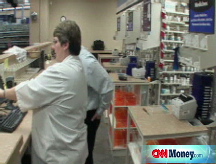Dollar tumbles amid return to risk
Barclays says it will not seek bailout cash, easing some fears about European banks and reviving risk appetite.
NEW YORK (CNNMoney.com) -- The U.S. dollar fell against the euro and the pound Monday, reversing a recent trend, as concerns about the U.K. banking sector eased.
Barclays, one of the U.K.'s largest banks, said it will not seek fresh capital from private investors or the U.K. government. The bank also reaffirmed that it expects 2008 pretax profits to be "well ahead" of £5.3 billion despite a writedown of £8 billion.
The pound rose to trade at $1.3961 after falling to a 23-year low against the U.S. dollar Friday of $1.35. The euro advanced 1.5% to $1.3164 from $1.2982 late Friday in New York.
Both currencies had been under pressure last week amid a spate of grim reports on the U.K. economy and concern about the health of the British banking sector.
"The high degree of risk aversion that played such a large part in currency movements last week seems to be abating as this one begins," Sacha Tihanyi, currency strategist at Scotia Capital in Toronto, wrote in a research note.
Many investors view the dollar as a safer alternative to assets like stocks and high-yielding currencies, which are more volatile in times of economic duress. As a result, the dollar often advances when the market expects economic conditions to worsen. Conversely, the buck usually retreats when investors anticipate better-than-expected outcomes.
In addition to the Barclays news, Monday's bullish tone was set by a $68 billion corporate merger in the pharmaceutical industry.
Pfizer (PFE, Fortune 500), one the world's leading pharma companies, announced it will buy rival drugmaker Wyeth (WYE, Fortune 500) in a cash-and-stock deal. The move helped boost confidence since mergers and acquisitions had ground to a halt amid a lack of available credit and a chilly business climate.
At the same time, Pfizer said it would cut 10% of its staff and close five of its manufacturing plants, as the recession takes its toll on the company's sales.
And Pfizer was just one of several major corporations to announce layoffs Monday. Home Depot (HD, Fortune 500) , Caterpillar (CAT, Fortune 500), Sprint Nextel (S, Fortune 500), John Deere (DE, Fortune 500) and ING (ING) all announced sizable job cuts.
Meanwhile, a pair of positive economic reports also bolstered the market's appetite for risk.
The National Association of Realtors said that home sales increased to a seasonally-adjusted, annualized rate of 4.74 million units from 4.45 million in November. Analysts were expecting a rate of 4.4 million units.
Separately, the Conference Board's index of leading economic indicators rose for the first time in six months. The industry group said the index gained 0.3% in December after falling 0.4% in November. The index had been forecast to decline 0.3% in December.
The Japanese yen, which is also considered a safe-haven, fell against the dollar. The greenback rose 0.3% to ¥89.05.
Against the euro, however, the yen fell 1.5% to ¥116.94 amid renewed risk appetite. Japan's currency was down 1.6% against the pound to ¥123.90.
Are you optimistic? Are you secure in your job and finances, and looking at the current economic climate as an opportunity? E-mail your story to realstories@cnnmoney.com and explain why you are optimistic and how you are taking advantage of the situation. You could be included in an upcoming article. ![]()



